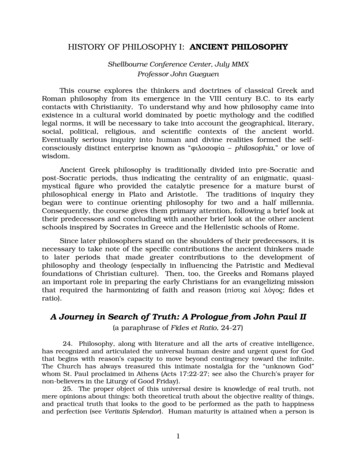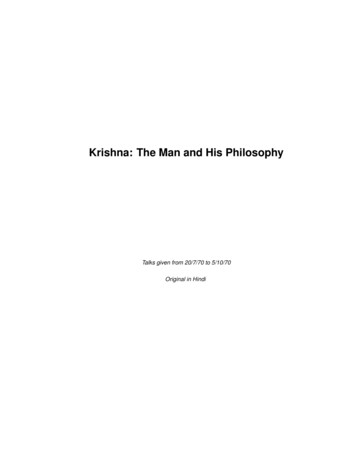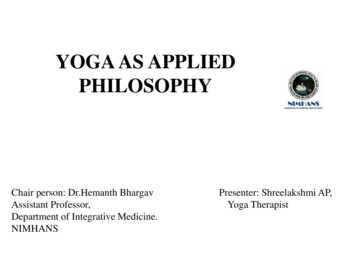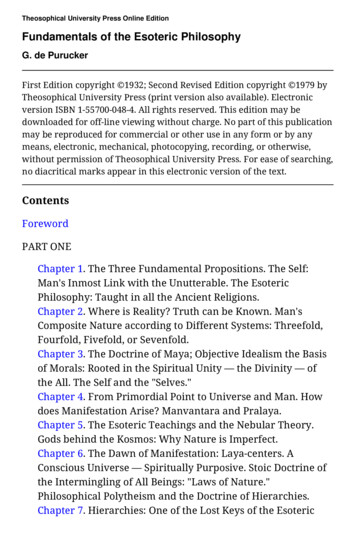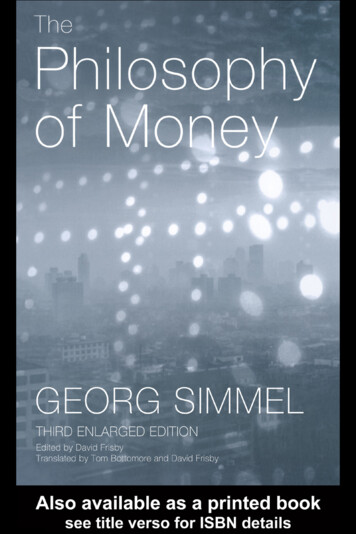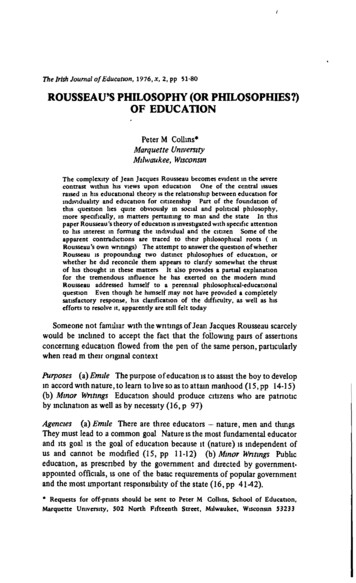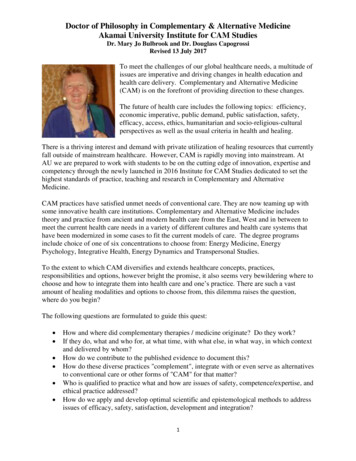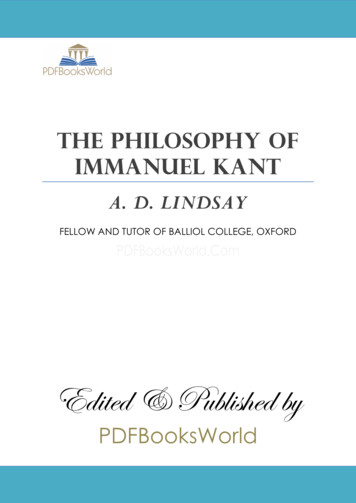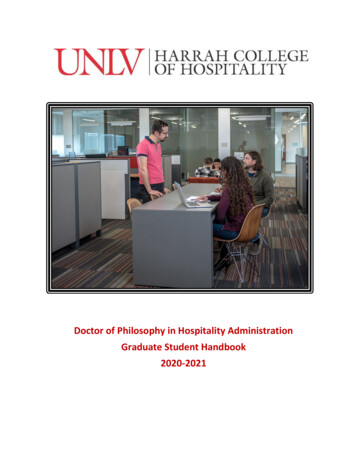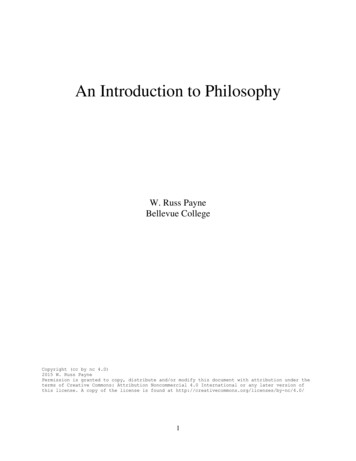
Transcription
An Introduction to PhilosophyW. Russ PayneBellevue CollegeCopyright (cc by nc 4.0)2015 W. Russ PaynePermission is granted to copy, distribute and/or modify this document with attribution under theterms of Creative Commons: Attribution Noncommercial 4.0 International or any later version ofthis license. A copy of the license is found at http://creativecommons.org/licenses/by-nc/4.0/1
ContentsIntroduction .3Chapter 1: What Philosophy Is .5Chapter 2: How to do Philosophy . .11Chapter 3: Ancient Philosophy . .23Chapter 4: Rationalism . . .38Chapter 5: Empiricism 50Chapter 6: Philosophy of Science . . 58Chapter 7: Philosophy of Mind . .72Chapter 8: Love and Happiness . .79Chapter 9: Meta Ethics 94Chapter 10: Right Action . .108Chapter 11: Social Justice . 1202
IntroductionThe goal of this text is to present philosophy to newcomers as a living discipline with historicalroots. While a few early chapters are historically organized, my goal in the historical chapters isto trace a developmental progression of thought that introduces basic philosophical methods andframes issues that remain relevant today. Later chapters are topically organized. These includephilosophy of science and philosophy of mind, areas where philosophy has shown dramaticrecent progress.This text concludes with four chapters on ethics, broadly construed. I cover traditional theories ofright action in the third of these. Students are first invited first to think about what is good forthemselves and their relationships in a chapter of love and happiness. Next a few meta-ethicalissues are considered; namely, whether they are moral truths and if so what makes them so. Theend of the ethics sequence addresses social justice, what it is for one’s community to be good.Our sphere of concern expands progressively through these chapters. Our inquiry recapitulatesthe course of development into moral maturity.Over the course of the text I’ve tried to outline the continuity of thought that leads from thehistorical roots of philosophy to a few of the diverse areas of inquiry that continue to makesignificant contributions to our understanding of ourselves and the world we live in.As an undergraduate philosophy major, one of my favorite professors once told me thatphilosophers really do have an influence on how people think. I was pleased to hear that the kindof inquiry I found interesting and rewarding might also be relevant to people’s lives and make adifference in the world. Then he completed his thought, “it only takes about 300 years.” Over thecourse of my teaching career, it has struck me that the opinions many of my students come toclass with have just about caught up with David Hume. So perhaps things are not quite as bad asmy professor suggested. While Hume did publish young, he was still an infant 300 years ago.My mission as a philosophy teacher has been to remedy this situation to some small degree.Most of the philosophy I read in graduate school was written by living philosophers, people Icould meet and converse with at conferences. Every time I’ve done so I’ve come back with anew list of living philosophers I hoped to read. My experience with living philosophers hasconvinced me that philosophy has progressed as dramatically as the sciences over the lastcentury or so. It is a great misfortune that the educated public by and large fails to recognize this.Philosophers, no doubt, carry much of the blame for this. At the cutting edge of the professionwe have been better researchers that ambassadors. At no time in history have there been as manybright people doing philosophy as there are today. Clearly articulated fresh perspectives onimportant issues abound. But at the same time, philosophy’s “market share” in the universitycurriculum has fallen to historic lows. If the flourishing of philosophy over the past century or so3
is to continue, philosophy as a living discipline will have to gain a broader following among thegeneral educated public. The front line for this campaign is the Philosophy 101 classroom.This is an open source text. It is freely available in an editable, downloadable electronic format.Anyone is free to obtain, distribute, edit, or revise this document in accordance with the opensource license. No one is free to claim proprietary rights to any part of this text. Sadly, one of themain functions of academic publishing, both of research and textbooks, has become that ofrestricting access to information. This is quite against the spirit of free and open discourse that isthe lifeblood of philosophy.Introductory students should be exposed to as many philosophical voices as possible. To thatend, links to primary source readings and supplemental material are imbedded in the text. I’verestricted myself to primary source materials that are freely available on the Web. Studentsshould require nothing more than a reliable Internet connection to access all of the required andrecommended materials for this course. Limiting primary and supplemental sources in this wayhas presented some challenges. Classic sources are readily available on the Web, though notalways in the best translations. Many contemporary philosophers post papers on the Internet, butthese are usually not intended for undergraduate readers. Most good philosophical writing forundergraduates is, unfortunately, proprietary, under copyright and hence unavailable for an opensource course. The strength of an open source text is that it is continually open to revision byanyone who’d care to improve it. And so I’d like to issue an open invitation to members of thephilosophical community to recommend writing suitable for this course that is currentlyavailable on the Web and has so far escaped my notice. Or, better yet, to write for this course.4
1. What Philosophy IsWhat is philosophy?Many answers have been offered in reply to this question and most are angling at somethingsimilar. My favorite answer is that philosophy is all of rational inquiry except for science.Perhaps you think science exhausts inquiry. About a hundred years ago, many philosophers,especially the Logical Positivists, thought there was nothing we could intelligibly inquire intoexcept for scientific matters. But this view is probably not right. What branch of scienceaddresses the question of whether or not science covers all of rational inquiry? If the questionstrikes you as puzzling, this might be because you already recognize that whether or not sciencecan answer every question is not itself a scientific issue. Questions about the limits of humaninquiry and knowledge are philosophical questions.We can get a better understanding of philosophy by considering what sorts of things other thanscientific issues humans might inquire into. Philosophical issues are as diverse and far ranging asthose we find in the sciences, but a great many of them fall into one of three big topic areas,metaphysics, epistemology, and ethics.MetaphysicsMetaphysical issues are concerned with the nature of reality. Traditional metaphysical issuesinclude the existence of God and the nature of human free will (assuming we have any). Here area few metaphysical questions of interest to contemporary philosophers: What is a thing? How arespace and time related? Does the past exist? How about the future? How many dimensions doesthe world have? Are there any entities beyond physical objects (like numbers, properties, andrelations)? If so, how are they related to physical objects? Historically, many philosophers haveproposed and defended specific metaphysical positions, often as part of systematic andcomprehensive metaphysical views. But attempts to establish systematic metaphysical worldviews have been notoriously unsuccessful.Since the 19th century many philosophers and scientists have been understandably suspicious ofmetaphysics, and it has frequently been dismissed as a waste of time, or worse, as meaningless.But in just the past few decades metaphysics has returned to vitality. As difficult as they are toresolve, metaphysical issues are also difficult to ignore for long. Contemporary analyticmetaphysics is typically taken to have more modest aims than definitively settling on the finaland complete truth about the underlying nature of reality. A better way to understandmetaphysics as it is currently practiced is as aiming at better understanding how various claimsabout the reality logically hang together or conflict. Metaphysicians analyze metaphysical5
puzzles and problems with the goal of better understanding how things could or could not be.Metaphysicians are in the business of exploring the realm of possibility and necessity. They areexplorers of logical space.EpistemologyEpistemology is concerned with the nature of knowledge and justified belief. What isknowledge? Can we have any knowledge at all? Can we have knowledge about the laws ofnature, the laws or morality, or the existence of other minds? The view that we can’t haveknowledge is called skepticism. An extreme form of skepticism denies that we can have anyknowledge whatsoever. But we might grant that we can have knowledge about some things andremain skeptics concerning other issues. Many people, for instance, are not skeptics aboutscientific knowledge, but are skeptics when it comes to knowledge of morality. Later in thiscourse we will entertain some skeptical worries about science and we will consider whetherethics is really in a more precarious position. Some critical attention reveals that scientificknowledge and moral knowledge face many of the same skeptical challenges and share somesimilar resources in addressing those challenges. Many of the popular reasons for being moreskeptical about morality than science turn on philosophical confusions we will address andattempt to clear up.Even if we lack absolute and certain knowledge of many things, our beliefs about those thingsmight yet be more or less reasonable or more or less likely to be true given the limited evidencewe have. Epistemology is also concerned with what it is for a belief to be rationally justified.Even if we can’t have certain knowledge of anything (or much), questions about what we oughtto believe remain relevant.EthicsWhile epistemology is concerned with what we ought to believe and how we ought to reason,Ethics is concerned with what we ought to do, how we ought to live, and how we ought toorganize our communities. Sadly, it comes as a surprise to many new philosophy students thatyou can reason about such things. Religiously inspired views about morality often take right andwrong to be simply a matter of what is commanded by a divine being. Moral Relativism, perhapsthe most popular opinion among people who have rejected faith, simply substitutes thecommands of society for the commands of God. Commands are simply to be obeyed, they arenot to be inquired into, assessed for reasonableness, or tested against the evidence. Thinking ofmorality in terms of whose commands are authoritative leaves no room for rational inquiry intohow we ought to live, how we ought to treat others, or how we ought to structure ourcommunities. Philosophy, on the other hand, takes seriously the possibility of rational inquiryinto these matters. If philosophy has not succeeded in coming up with absolutely certain anddefinitive answer in ethics, this is in part because philosophers take the answers to moral6
questions to be things we need to discover, not simply matters of somebody’s say so. The longand difficult history of science should give us some humble recognition of how difficult andfrustrating careful inquiry and investigation can be. So we don’t know for certain what the lawsof morality are. We also don’t have a unified field theory in physics. Why expect morality to beany easier?So we might think of metaphysics as concerned with “What is it?” questions, epistemology asconcerned with “How do we know?” questions, and ethics as concerned with “What should wedo about it?” questions. Many interesting lines of inquiry cut across these three kinds ofquestions. The philosophy of science, for instance, is concerned with metaphysical issues aboutwhat science is, but also with epistemological questions about how we can know scientific truths.The philosophy of love is similarly concerned with metaphysical questions about what love is.But it also concerned with questions about the value of love that are more ethical in character.Assorted tangled vines of inquiry branch off from the three major trunks of philosophy,intermingle between them, and ultimately with scientific issues as well. The notion that somebranches of human inquiry can proceed entirely independent of others ultimately becomesdifficult to sustain. The scientist who neglects philosophy runs the same risk of ignorance as thephilosopher who neglects science.What is the value of philosophy?Philosophy is a branch of human inquiry and as such it aims at knowledge and understanding.We might expect that the value of philosophy lies in the value of the ends that it seeks, theknowledge and understanding it reveals. But philosophy is rather notorious for failing toestablish definitive knowledge on the matters it investigates. I’m not so sure this reputation iswell deserved. We do learn much from doing philosophy. Philosophy often clearly reveals whysome initially attractive answers to big philosophical questions are deeply problematic, forinstance. But granted, philosophy often frustrates our craving for straightforward convictions. Inour first reading, Bertrand Russell argues that there is great value in doing philosophy preciselybecause it frustrates our desire for quick easy answers. In denying us easy answers to bigquestions and undermining complacent convictions, philosophy liberates us from narrow mindedconventional thinking and opens our minds to new possibilities. Philosophy often provides anantidote to prejudice not by settling big questions, but by revealing just how hard it is to settlethose questions. It can lead us to question our comfortably complacent conventional opinions.The Value of PhilosophyReading: Our first Reading is Chapter 15 of Bertrand Russell’s Problems of Philosophy, “TheValue of Philosophy.” The whole book can be found here:7
http://www.ditext.com/russell/russell.html. (Follow one of these links and do the reading beforecontinuing with discussion of it below)We humans are very prone to suffer from a psychological predicament we might call “thesecurity blanket paradox.” We know the world is full of hazards, and like passengers after ashipwreck, we tend to latch on to something for a sense of safety. We might cling to apossession, another person, our cherished beliefs, or any combination of these. The Americanpragmatist philosopher Charles Sanders Peirce speaks of doubt and uncertainty as uncomfortableanxiety-producing states. This would help explain why we tend to cling, even desperately, tobeliefs we find comforting. This clinging strategy, however, leads us into a predicament thatbecomes clear once we notice that having a security blanket just gives us one more thing toworry about. In addition to worrying about our own safety, we now are anxious about oursecurity blanket getting lost or damaged. The asset becomes a liability. The clinging strategy fordealing with uncertainty and fear becomes counterproductive.While not calling it by this name, Russell describes the intellectual consequences of the securityblanket paradox vividly:The man who has no tincture of philosophy goes through life imprisoned in theprejudices derived from common sense, from the habitual beliefs of his age or his nation,and from convictions which have grown up in his mind without the cooperation orconsent of his deliberate reason. . . The life of the instinctive man is shut up within thecircle of his private interests. . . In such a life there is something feverish and confined, incomparison with which the philosophic life is calm and free. The private world ofinstinctive interests is a small one, set in the midst of a great and powerful world whichmust, sooner or later, lay our private world in ruins.The primary value of philosophy according to Russell is that it loosens the grip of uncriticallyheld opinion and opens the mind to a liberating range of new possibilities to explore.The value of philosophy is, in fact, to be sought largely in its very uncertainty. . .Philosophy, though unable to tell us with certainty what is the true answer to the doubtswhich it raises, is able to suggest many possibilities which enlarge our thoughts and freethem from the tyranny of custom. Thus, while diminishing our feeling of certainty as towhat things are, it greatly increases our knowledge as to what they may be; it removes thesomewhat arrogant dogmatism of those who have never traveled into the region ofliberating doubt, and it keeps alive our sense of wonder by showing familiar things in anunfamiliar aspect.Here we are faced with a stark choice between the feeling of safety we might derive fromclinging to opinions we are accustomed to and the liberation that comes with loosening our gripon these in order to explore new ideas. The paradox of the security blanket should make it clear8
what choice we should consider rational. Russell, of course, compellingly affirms choosing theliberty of free and open inquiry.Must we remain forever uncertain about philosophical matters? Russell does hold that somephilosophical questions appear to be unanswerable (at least by us). But he doesn’t say this aboutevery philosophical issue. In fact, he gives credit to philosophical successes for the birth ofvarious branches of the sciences. Many of the philosophical questions we care most deeplyabout, however - like whether our lives are significant, whether there is objective value thattranscends our subjective interests - sometimes seem to be unsolvable and so remain perennialphilosophical concerns. But we shouldn’t be too certain about this either. Russell is hardly thefinal authority on what in philosophy is or isn’t resolvable. Keep in mind that Russell waswriting 100 years ago and a lot has happened in philosophy in the mean time (not in small partthanks to Russell’s own definitive contributions). Problems that looked unsolvable to the bestexperts a hundred years ago often look quite solvable by current experts. The sciences are nodifferent in this regard. The structure of DNA would not have been considered knowable fairlyrecently. That there was such a structure to discover could not even have been conceivable priorto Mendel and Darwin (and here we are only talking 150 years ago).Further, it is often possible to make real progress in understanding issues even when they can’tbe definitively settled. We can often rule out many potential answers to philosophical questionseven when we can’t narrow things down to a single correct answer. And we can learn a greatdeal about the implications of and challenges for the possible answers that remain.Even where philosophy can’t settle an issue, it’s not quite correct to conclude that there is noright answer. When we can’t settle an issue this usually just tells us something about our ownlimitations. There may still be a specific right answer; we just can’t tell conclusively what it is.It’s easy to appreciate this point with a non-philosophical issue. Perhaps we can’t know whetheror not there is intelligent life on other planets. But surely there is or there isn’t intelligent life onother planets. Similarly, we may never establish that humans do or don’t have free will, but itstill seems that there must be some fact of the matter. It would be intellectually arrogant of us tothink that a question has no right answer just because we aren’t able to figure out what thatanswer is.Review and Discussion QuestionsThe first quiz covers this chapter and Bertrand Russell’s essay “The Value of Philosophy.” Youwill find a link to the quiz in the course module for this chapter. Watch the course calendar forwhen to take the quiz. The following questions will help you prepare. Feel free to take thesequestions up on the discussion board.On this lecture note: Why should we doubt that science covers all of human inquiry?9
What are some metaphysical issues? Some epistemological and ethical issues?What problem does the view that morality is simply a matter of the say-so of someauthority lead to?On Russell’s “The Value of Philosophy”: What is the aim of philosophy according to Russell?How is philosophy connected to the sciences?What value is there in the uncertainty that philosophical inquiry often produces?On the commentary on Russell: Explain the “security blanket” paradox.How can understanding of issues be advanced even when definitive knowledge can’t behad?What’s the difference between saying we can’t know the answer to some question andsaying that there is no truth of the matter?Finally, consider some of the definitions of philosophy offered by philosophers on the pagelinked at the opening of the lecture. A number of these would make for good discussion. Here’sthe link again: what-is-philosophy/10
2. How Philosophy is DoneAs a kind of inquiry, philosophy is aimed at establishing knowledge and understanding. Evenwhere certain knowledge about a particular issue can’t be had, there are often interesting thingsto learn about why we can’t have certainty and what sorts of less-than-certain reasons there arefor or against holding a position on that issue. So, rational inquiry may be interesting and fruitfuleven when we are denied straight-forward answers to our initial questions. Once we raise aphilosophical issue, whether about the nature of justice or about the nature of reality, we want toask what can be said for or against the various possible answers to our question. Here we areengaged in formulating arguments. Some arguments give us better reasons or accepting theirconclusions than others. Once we have formulated an argument, we want to evaluate thereasoning it offers. If you want to know what philosophers do, this is a pretty good answer:philosophers formulate and evaluate arguments.Your introduction to philosophy should be as much a training in how to do philosophy as it is achance to get to acquainted with the views of various philosophers. To that end, you shouldcarefully study the sections below on arguments.Once a philosophical position is considered, we want to ask what arguments can be advanced insupport of or against that issue. We then want to examine the quality of the arguments.Evaluating flawed arguments often points the way towards other arguments and the process offormulating, clarifying, and evaluating arguments continues. This method of question and answerin which we recursively formulate, clarify, and evaluate arguments is known as dialectic.Dialectic looks a lot like debate, but a big difference lies in the respective goals of the twoactivities. The goal of a debate is to win by persuading an audience that your position is right andyour opponent’s is wrong. Dialectic, on the other hand, is aimed at inquiry. The goal is to learnsomething new about the issue under discussion. Unlike debate, in dialectic your sharpest criticis your best friend. Critical evaluation of your argument brings new evidence and reasoning tolight. The person you disagree with on a philosophical issue is often the person you stand to learnthe most from (and this doesn’t necessarily depend on which of you is closer to the truth of thematter).Dialectic is sometimes referred to as the Socratic Method after the famous originator of thissystematic style of inquiry. We will get introduced to some of Plato’s dialogues chronicling theexploits of Socrates in the next chapter on Ancient Greek Philosophy. This will give you a goodsense for how the Socratic Method works. Then watch for how the Socratic Method is deployedthroughout the rest of the course.11
TruthAs varieties of rational inquiry, it’s natural to think that science and philosophy are mainlyconcerned with getting at the truth about things. There are some interesting and some confusedchallenges to the idea that philosophy and science are truth oriented. But for now let’s assumethat rational inquiry is truth oriented and address a couple of questions about truth. Let’s focuson just these two: What is it for a claim to be true?How do we determine that a claim is true?It’s important to keep these two questions separate. Questions about how we know whethersomething is true are epistemic questions. But the question of what it is for something to be trueis not an epistemic issue. The truth of a claim is quite independent of how or whether we know itto be true. If you are not sure about this, consider the claim that there is intelligent life on otherplanets and the claim that there is no intelligent life on other planets. I assume we don’t knowwhich of these two claims is true, but surely one of them is. Whichever of these claims is true, itsbeing true doesn’t depend in any way on whether or how we know it to be true. There are manytruths that will never be known or believed by anyone, and appreciating this is enough to see thatthe truth of a claim is not relative to belief, knowledge, proof, or any other epistemic notion.But then what is it for a claim to be true? The ordinary everyday notion of truth would have itthat a claim is true if the world is the way the claim says it is. And this is pretty much all we areafter. When we make a claim, we represent some part of the world as being a certain way. If howmy claim represents the world fits with the way the world is, then my claim is true. Truth, then,is correspondence, or good fit, between what we assert and the way things are.Is Truth Relative to Meaning?There is a further potential source of confusion about truth that might be worth addressing at thispoint. Words and sentences can be used in lots of different ways. Even if we are not beinginventive with language, there is lots of vagueness and ambiguity built into natural language. Atempting pitfall in thinking about truth is to think that truth is somehow relative to meaning oropen to interpretation.We’d all agree that it’s true that dogs are canines. But suppose we used the word “dog” to referto housecats instead. A word is just a sound or a string of letters. We can, in principle, attach anymeaning we like to the word “dog”. If we used the word “dog” to refer to housecats, then thesentence “Dogs are canines” would be false. Doesn’t this make truth relative to meaning orinterpretation? Well, in a way yes, but not really.The truth of sentences, bits of language, is relative to meaning. But the relativity at issue here isentirely linguistic. It’s simply the result of the meaning of words and sentences being relative to12
linguistic convention. But our everyday notion of truth is not about linguistic convention anymore than it is about knowledge or belief. Our notion of truth is fundamentally about thecorrespondence between what is meant by a sentence and the way the world is. Philosophersoften refer to what is meant or expressed by a sentence as a proposition. While a sentence is apiece of language that has a meaning, the proposition it expresses is not itself a piece oflanguage. Consider “Schnei ist wies” and “Snow is white”. The first sentence is German forsnow is white. These are distinct sentences and this is clear because they belong to differentlanguages. But they say the same thing. They both express the proposition that snow is white (weare stuck with using English to refer to the proposition. But that doesn’t mean the proposition islinguistic. We use English to refer to lots of things that aren’t themselves part of language; dogsand cats for instance).So the proposition expressed by a sentence is not itself a linguistic thing. Being a non-linguisticthing, the proposition does not have a meaning. Rather the proposition is what is meant. For a bitof language to be open to interpretation is for us to be able to attach different meanings to it. Butthe meanings themselves are not open to further interpretation. And it is the proposition, what ismeant by the sentence, that is the fundamental bearer of truth or falsity. A proposition is truewhen it represents things the way they are. So when I speak of arguments consisting of claimsyou might bear in mind that its propositions, not sentences I’m talking about. If we misinterpretthe sentence, then we haven’t yet gotten on to the claim being made and hence probably don’tfully understand the argument. Getting clear on just what an argument says is critical to thedialectical process.Even if you are exceptionally bright, you probably found the last couple paragraphs ratherchallenging. That’s OK. You might work through them again more carefully and come back to itin a day or two if it’s still a struggle. The path to becoming a better critical thinker is more likemountain climbing than a walk in the park, but with this crucial difference: no bones get brokenwhen you fall off an intellectual cliff. So you are always free to try to scale it again. We can sumup the key points of the last few paragraphs as follows: We use sentences, bits of language, to express propositions.The proposition, what is meant by the sentence, represents the world as being some way.The proposition is true when it represents the world in a way that corresponds to how theworld is.Truth, understood as correspondence between a claim (a proposition) and the way theworld is, is not relative to meaning, knowledge, belief, or opinion.Hopefully we now have a better grip on what it is for a claim to be true. A claim is true just whenit represents things as they are. As is frequently the case in philosophy, the real work here wa
3 Introduction The goal of this text is to present philosophy to newcomers as a living discipline with historical roots. While a fe
